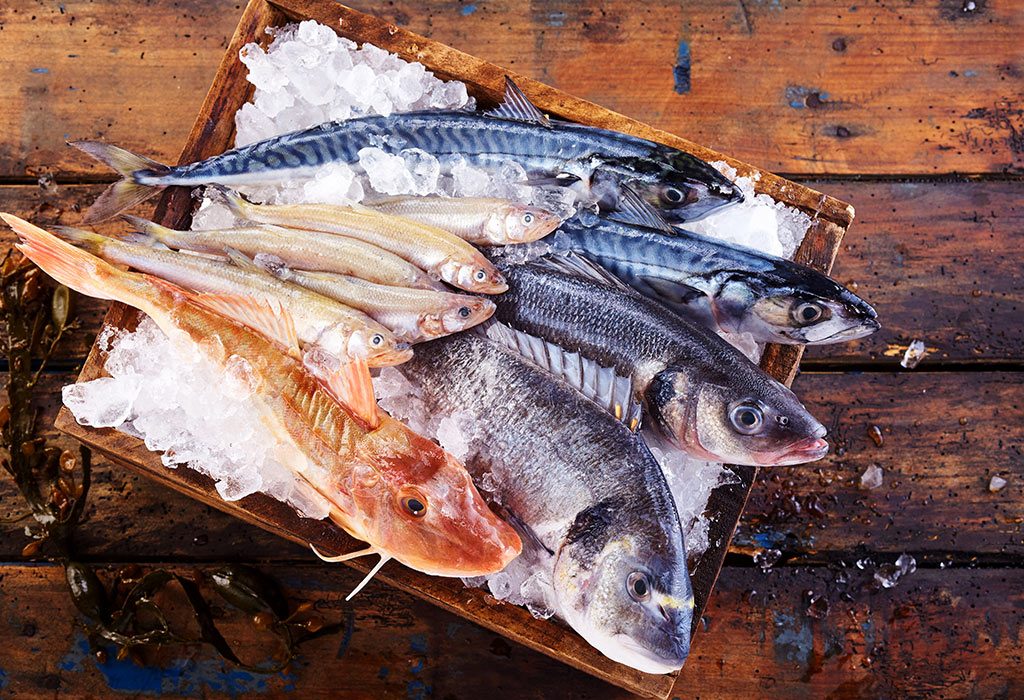In this Article
Your pregnancy must have been fraught with dilemmas as to whether you can consume a particular type of food, and you might have been looking forward to delivery just so you can go back to eating whatever you want. Unfortunately, there are some types of food that mothers should not consume even while breastfeeding their baby.
Fishes have been the cause of a lot of confusion among mothers during the time of pregnancy. Similarly, you will need to think long and hard before cooking fish or including it as a part of your meal even when you are breastfeeding. Some types of fish are dangerous, while others are healthy- so choose wisely. In this article, let us take a look at which types of fish are harmless, and other aspects related to including it in your meal plans.
Can You Eat Fish, If You Are Breastfeeding?
Actually, it has been found via extensive research that consuming fishes while breastfeeding is actually necessary for the health of the child. This means that you will have to increase your fish consumption so that your child grows up to be healthier. However, you need to remember that the fish should not contain any harsh chemicals, like mercury.
Fishes have a range of important vitamins and nutrients, like EPA, DHA and vitamin D. Fishes are also rich in iodine, magnesium, iron and copper, all of which play a huge role in the development of your child. Therefore, you must definitely add it to your meal plan in order to make your baby healthier.
It was actually found that the children of mothers who consumed fish during breastfeeding were healthier than the ones whose mothers did not touch it during the course of pregnancy and breastfeeding. Therefore, fish is a definite yes during the time of lactation.
Benefits of Consuming Fish While Nursing
There are a lot of benefits to having fish when you are nursing your baby. Some of these are given below.
- Fishes have a lot of important nutrients which not only benefit the child but also the mother as she consumes them.
- Fishes are the major source of Omega 3 Fatty Acids, which are a type of fats found in seafood. This plays a huge role in the brain development of your young one and makes him healthier overall. The DHA and EPA in Omega 3 also help in the development of the nervous system of your baby.
- Fish contains low saturated fat and large amounts of protein, which are helpful for the development of your baby’s body.
- Early child development has been found to be more common in mothers who consumed fish while lactating, than in mothers who did not.

Therefore, it is a good idea for women to consume fish when they are breastfeeding, for the health of their child. However, the fish must be safe to consume.
Side Effects of Eating Fish While Breastfeeding
While consuming fish is important for the benefit of your baby, it also important that you check whether the fish is safe before eating it. There are a lot of side-effects to consuming fish:
- Coal fire power plants deposit mercury into the rivers and seas. The bacteria in the water convert this into methyl mercury which the fish consume through water and food. This content remains in the fish even after it has been cooked and hence is very dangerous.
- A high level of mercury has been found in some types of fish, like the swordfish, shark and the mackerel and consuming these fishes can affect cognitive development.
- Methylmercury can impair brain development in the baby if it enters his body. While only a small amount enters the breastmilk even if the mother consumes mercury, it is enough to affect the child adversely and make him more vulnerable.
- Mercury can affect the development of the baby quite badly. The parts of the brain used to read, think, learn, remember and even motor skills can be reduced if mercury enters his body. Also, the human body has a tendency to absorb the chemical quickly- therefore, fish with high mercury levels must be avoided.
- There is no doubt that the water bodies are getting increasingly polluted today, and this rubs off on the fish you cook. This means that harmful chemicals or pollutants may enter the body of the child if you consume them.
- Large predator fish are more likely to have higher levels of mercury, as they consume the smaller fish around them.
- The canned white tuna available in a supermarket has high levels of mercury in them which is not recommended for consumption.

How to Tell If Fish is Fresh or Not?
You can check whether the fish is fresh by simply observing the outer surface of its body. If the scales are shiny and firm, it means that the fish you have is fresh. Else, if it looks dull and unappealing, you should not buy the fish.
Fish That Are Safe to Eat While Breastfeeding
There are a lot of safe fishes for breastfeeding moms, which contribute effectively towards the health of your child. These include:
- Char
- Capelin
- Atlantic mackerel
- Herring
- Shrimp
- Mullet
- Clam
- Salmon
- Lake whitefish
- Rainbow trout
- Hake
- Oysters
- Anchovy
- Blue crab

Fish to Avoid During Nursing
Similarly, there are some types of fish not recommended to eat while breastfeeding for mothers. These contain harmful chemicals like mercury, which can affect the health of the child adversely. These include:
- Shark
- Marlin
- Swordfish
- Salmon, fresh tuna, trout, mackerel and herring- you should not eat more than two portions of these per week.
- Non-oily fishes, like rock salmon, sea bass and halibut.
Alternatives to Fish to Get Omega-3s
Some food items like eggs, milk and yoghurt are now fortified with Omega-3s, but they contain only ALA- while it does provide some benefits, you will not get EPA or DHA from these food items. Flaxseed is also another food item with ALA. Therefore, you will have to opt for omega-3s supplements in order to get the required amount of the nutrient.
Even though fish can provide a lot of nutrition and health benefits to your baby, you need to be careful about whether it contains any harmful substances before consuming them if you are nursing. The harmful effects far outweigh the benefits, so check thoroughly before you eat fish- else, opt for supplements.









